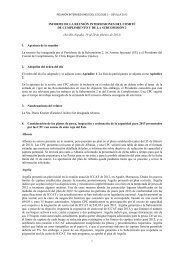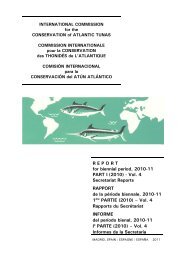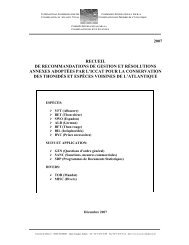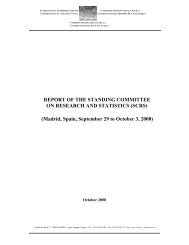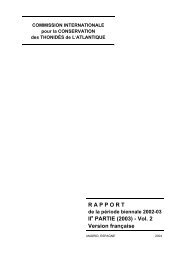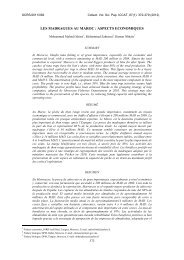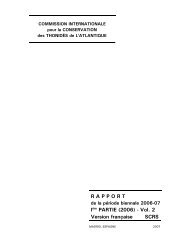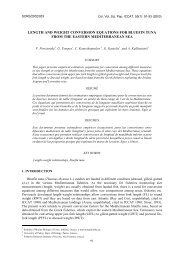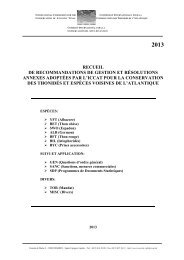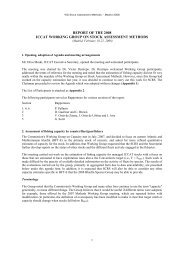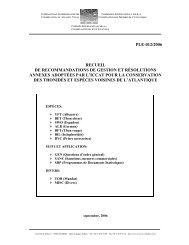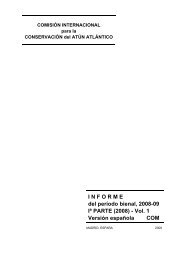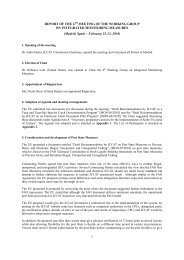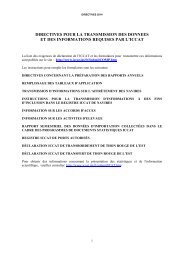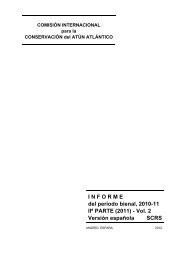E - Iccat
E - Iccat
E - Iccat
Create successful ePaper yourself
Turn your PDF publications into a flip-book with our unique Google optimized e-Paper software.
PANEL APPENDICES<br />
Could it be considered that this significant difference be sufficient to cover the existing uncertainties for this<br />
stock<br />
Distinguished delegates, we are convinced that the coherence in the way of acting of this Commission will<br />
resolve many of the contradictions included herein, as well as many of the uncertainties presented by the<br />
delegates yesterday for an improved management of the resource. However, it is certain that the principle of<br />
equity will be welcomed positively by the thousands of responsible fishermen that fish East bluefin tuna and<br />
who have made great sacrifices. As a result of stock recovery, fishermen are confident that some jobs could be<br />
recovered and that they would stop feeling discriminated.<br />
The biological, social and economic sustainability must be the lighthouse to illuminate them in this sea full of<br />
uncertainties.<br />
Reference<br />
Belda, E.J. and Cort, J.L., 2011, Simulation of Biomass trends of eastern bluefin tuna (Thunnus thynnus) stock<br />
under current Management Regulations. Collect. Vol. Sci. Pap. ICCAT, 66(2): 989-994.<br />
Statement by the Observer from the Pew Environment Group to Panel 2<br />
Appendix 6 to ANNEX 9<br />
We call your attention to our policy statement, “Better Management for all ICCAT Species: Time to Fill In the<br />
Puzzle Pieces”, which was circulated electronically to all Contracting Parties (CPs), and is available on our<br />
website at www.pewenvironment.org/ip (in English, French, and Spanish) along with copies of our other<br />
materials. The following supplements that policy statement as relates to Atlantic bluefin tuna.<br />
ICCAT made a strong commitment to conservation when they set Atlantic bluefin tuna (BFT) quotas for 2010-<br />
2012 based on the recommendations of the Standing Committee on Research and Statistics (SCRS). This year is<br />
the first real test of ICCAT’s commitment to continue to follow the scientific advice. This decision will not only<br />
influence the health of bluefin tuna populations but also has significant consequences for the reputation of<br />
ICCAT as a global leader in fisheries science and management.<br />
This commitment to following the scientific advice has begun to pay off; the latest stock assessment for bluefin<br />
shows signs of increasing populations in both the eastern and western Atlantic. However, the stock assessment<br />
report cautioned that uncertainties in the data and model meant that the SCRS could not accurately assess the<br />
magnitude and speed of recovery. In the executive summary of the stock assessment report, the SCRS referenced<br />
this “uncertainty” 18 times. In the summary of its eastern stock assessment, it mentioned “uncertainty” almost as<br />
often as the word “bluefin”. The 2012 assessment also did not include key pieces of information including new<br />
estimates of the ongoing high level of illegal fishing in the eastern Atlantic and Mediterranean and new science<br />
confirming mixing between the eastern and western populations.<br />
SCRS Recommendation<br />
As a result of the uncertainty in the assessment, the SCRS recommended that the western Atlantic quota be<br />
maintained at 1,750 t and the eastern quota maintained at 12,900 t or not increased to above 13,500 t (the 2010<br />
quota). They also recognized the need to update the stock assessment model to use more modern assessment<br />
methods and to better reflect current knowledge of bluefin behavior and biology.<br />
BFT quotas<br />
To avoid significantly undermining any recent progress, we urges the members of Panel 2 to again follow the<br />
scientific advice when setting catch limits for the next three years, which will enable the stocks to continue to<br />
increase while allowing time to incorporate the best available scientific data into future assessments. These<br />
science-based limits, along with measures to reduce illegal fishing-including swift implementation of an<br />
electronic Bluefin Catch Document system by all CPCs and holding illegal fishing vessels and governments that<br />
flag them accountable –are vital to turn this glimmer of hope into a real recovery of Atlantic bluefin tuna.<br />
259



